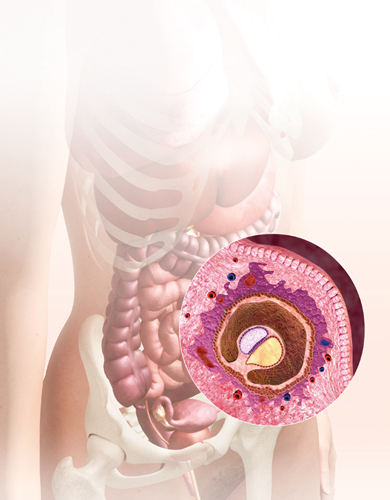Your 4th Week
The embryo-to-be, now
securely implanted in the lining of your uterus, is starting to develop.
Although you could do a home pregnancy test this week, you may end up
disappointed or uncertain because at this stage a definite result is
unlikely. It can be nerve racking, wondering if an unwanted period is
about to arrive and dash your hopes. Talk to your partner and share your
feelings with him—he may be anxious, too.
NOTE
This week, you’ll need a little patience as you wait, wonder, and hope
Implanted embryo

You are 3 Weeks and 1 Day 258 days to go…
Pregnancy hormones
are being produced, but it may be difficult to detect them accurately,
so it’s best to wait before you do a test.
Your baby today
This is a cross section of the ball of cells embedded in the
uterus at this early stage of pregnancy. It contains fluid in the center
and two areas of white cells with a darker streak of cells between
them—these will form the embryo, now less than 0.5 mm long.

You might be eager to do a pregnancy test as you enter the fourth week of your cycle. Most women use over-the-counter home pregnancy tests.
These are simple to use and work by detecting the levels of hCG in your
urine—this is the hormone that is produced as soon as the embryo
implants in the lining of the uterus (see You are 3 Weeks Exactly).
There are home pregnancy
tests that claim to detect a pregnancy six days before your period is
due. But if you use one of these and test this early, your hCG levels
(see You are 3 Weeks and 1 Day) may not be high enough to give a positive result, even though you might be pregnant.
… Doctor
| Q: |
I’m worried about doing a pregnancy test because I think my partner is going to be disappointed if I’m not pregnant.
|
| A: |
Feeling pressured to conceive is stressful, and this can affect the hypothalamus (see This is Day 4 of your Menstrual Cycle)—the
structure in your brain that governs your menstrual cycle. So your
partner’s avid interest may actually be counterproductive.
Be honest with
your partner about how you feel. Explain to him that you share his
enthusiasm for having a baby, but that you’re feeling pressured, and
that you’re worried it will affect your ability to conceive. Conversely,
if you aren’t entirely sure that you are ready for a baby, now is the
time to discuss this, too. Pregnancy is a life-changing event, and both
you and your partner need to be fully committed, and also aware that it
can, in itself, be stressful.
Have fun together and make sure the pressure to conceive doesn’t take the fun and spontaneity out of your lovemaking (see Pressure to conceive).
|
Your pregnancy diary
Trying to get pregnant is an exciting experience,
so why not keep a written record—it’s a good way to pass time in this
interim period while you’re waiting to take a pregnancy test. Rather
than just noting down the dates of your period and signs of ovulation,
use it to record the highs and lows so far.
Once you’re pregnant,
you can continue to use the diary to record your feelings: for example,
your emotions when you saw the positive symbol on the pregnancy testing
kit; how you broke the news to your partner and his response; what your
baby’s first kick felt like; the best and worst aspects of being
pregnant. You may also find that letting off steam about your partner’s
quirks or your mother-in-law’s idiosyncrasies is surprisingly
therapeutic!
Besides providing a
unique record of your pregnancy, keeping a journal can also help you in
subsequent pregnancies: for example, you may find it reassuring to look
back and find that morning sickness was just a phase.

You are 3 Weeks and 2 Days 257 days to go…
Adopting a healthy lifestyle and improving your well-being are sensible measures now that you might be pregnant.
Your baby today
In this computer-generated image the entire blastocyst can be
seen embedded in the lining of the uterus. The cells that will develop
into the embryo are seen as the dark area in the 12 o’clock position.

Once your pregnancy is confirmed
in the next week or so, you’ll find you’re bombarded with more health
information than ever. Is your diet well balanced? Could you cut back on
the amount of salt, sugar, and fast food you eat? Are you eating plenty
of fruit and vegetables, particularly leafy green vegetables, which are
a good source of folic acid. Are you exercising enough and safely? Even
though you don’t know you’re pregnant yet, it’s worth being aware of
the recommended advice and making some basic dietary and lifestyle
changes. Turn to the section on pages 14–29 for some up-to-date
information. It’s also worth being aware of the early signs of pregnancy
so you know what’s normal.
If you have a preexisting medical condition or are taking medication, seek medical advice.
Get gentle exercise, such as walking or swimming, which are ideal before, during, and after pregnancy.

Cultural beliefs
Here’s what some cultures believe:
Hindu fathers
part the hair on their partner’s head three times upward from the front
to the back to boost the development of the growing baby.
In some countries,
there is great emphasis placed on protecting the unborn baby. In
Thailand, the pregnant woman’s abdomen may be painted to ward off evil
spirits. It is also believed that giving gifts before the birth will
attract evil spirits.
There are at least 30 chemicals in cigarette smoke that can adversely affect fertility.
Because smoking reduces
the rate at which cells replicate, it may cause most damage during the
first days and weeks of pregnancy. In addition to causing fertility
problems in women, smoking can have negative effects on sperm and reduce
testosterone in men.
… Your health
Lifestyle changes
If you smoke, you should quit
(so should your partner) for health reasons. Once you’re pregnant, not
smoking will reduce the risk of miscarriage, stillbirth, premature
birth, low birth weight, and sudden infant death.
You should also
stop drinking alcohol entirely. The current advice from the US Surgeon
General is to avoid drinking alcohol completely while trying to get
pregnant and once you are pregnant, since there is no known safe
consumption level for pregnant women.
You are 3 Weeks and 3 Days 256 days to go…
Try to stay busy to distract yourself from constantly wondering whether you’re pregnant, and think positively.
Waiting for your period to start—or
better yet, not start—can be quite stressful when you’re trying to
conceive. If your menstrual cycle is irregular you may not know when
your period is due and therefore may not know if you’re late and
potentially pregnant or not. The uncertainty is likely to make you
anxious and every time you go to the bathroom you dread seeing that your
period has started.
Whether or not you
know you have fertility problems, the wait can be difficult. If you do
get your period, the disappointment can be hard. The cycle of having
your period, waiting for ovulation, hoping you’re pregnant, and then
finding out you’re not can become very wearing month after month.
If you have been
trying to conceive for a year with no luck then you should go to your
doctor for tests. Or go at six months if you are over 35 or know that
you may have fertility problems, such as blocked fallopian tubes. Try
confiding in a good friend about your problems so that you have someone
to talk to, but try not to become obsessive and let it dominate all your
relationships.
If you’ve only
just started trying, remember there is a only a one in four or five
chance that you will conceive each month, so you’re unlikely to get
pregnant in the first month of trying!
If you’re over 35
and have been trying to conceive for six months, speak to your doctor
about fertility tests. You should both be checked because your partner’s
sperm will need to be tested too. You will be given blood tests.

… Doctor
| Q: |
I did an early pregnancy test and have failed to conceive
again, for the sixth month. Could it be because I have irregular
periods?
|
| A: |
Menstrual cycles that vary more than a few days in length from
month to month are considered irregular. An irregular cycle can be
troublesome when trying to conceive, but being aware of the signs of ovulation can help you determine when you are approaching your short window of fertility.
Irregular
ovulation and menstruation account for around 30–40 percent of
fertility problems. Many factors determine how fertile a woman is, such
as her age, whether her cervical fluid is wet enough to sustain sperm,
or whether her fallopian tubes are open, but the most important factor
is whether she ovulates regularly. Sometimes, a condition called
anovulation occurs, in which there is irregular menstrual bleeding but
no ovulation. If you don’t release an egg each month, you won’t have as
many chances to conceive. You may be given medication to stimulate egg
production and boost ovulation.
|
Around half of pregnancies in the US could be accidental.
According to the US
Centers for Disease Control and Prevention’s Pregnancy Risk Assessment
Monitoring System, 49 percent of all US pregnancies, and 31 percent of
US pregnancies resulting in a live birth, are unintended. Data collected
is from 60 percent of US births in 31 states and one city.